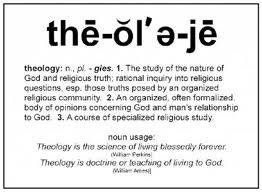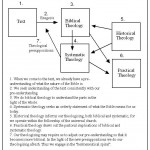 Check out these definitions of theology, all of which I found in one place or another in my class notes:
Check out these definitions of theology, all of which I found in one place or another in my class notes:
The most basic definition is “The study (logos) of God (theos).”
The most common definition of theology is “faith seeking understanding.”
The broadest definition is “One’s attempt to comprehend his or her religious beliefs.”
Here is what Lewis Sperry Chafer wrote:
Systematic Theology is the collecting, scientifically arranging comparing, exhibiting, and defending of all facts from any and every source concerning God and His works.
Charles Hodge said this:
Theology is the science of the facts of divine revelation so far as those facts concern the nature of God and our relation to Him, as His creatures, as sinners, and as the subjects of redemption.
And we cannot forget Millard Erickson:
Theology is that discipline which strives to give a coherent statement of the doctrines of the Christian faith, based primarily upon the Scriptures, placed in the context of culture in general, worded in a contemporary idiom, and related to issues of life.
Doesn’t theology sound great?!
Here’s one that is a little condescending, but which I think was meant as a joke:

I love G. K. Chesterton! He can even bring humor to dry and dusty definitions of theology.
It’s not that these definitions are wrong. They aren’t. And it’s not that theology is boring. It really isn’t.
It is just that all these definitions seem to miss the whole purpose of theology. Maybe you don’t need to include the purpose of theology within the definition of theology, but it seems that by leaving the purpose out of the definitions, the process of doing theology becomes more important than actually accomplishing what theology is supposed to do.
And what is that? The goal of theology is to draw us closer to God and each other in love.
But since when does theology accomplish love? Theology is notoriously divisive. If we can even argue about the definition of theology, it’s no wonder that theology itself become one big argument. When the definitions of theology only includes goals (as noble as they are) of knowing the truth and being right, then the critical element of love gets left out of the equation.
Maybe if we started over and included love in our definitions of theology, we could avoid some of the divisions later on.
I sometimes think the determining factor for whether you have “correct” theology is not how many degrees you earn, how many books you publish, or how many Bible verses you reference, but rather, how does what you believe flow out of you in love toward others?
If what you believe does not lead you to love, then I would argue that what you believe is wrong.
So can we come up with a definition of theology that is simple for all to understand and includes the goal of love?
Here is my attempt:
Theology is learning about God in a way that causes us to love as He loves.
What do you think?




How about this? “Theology is learning to see God, the world, and mankind as God would have us to see them.”
A lot of people get bent out of shape about all the abstract concepts of theology, but at the end of the day it’s just simply about learning what’s true. And it’s important – proper belief defines every other area of our life.
I like the emphasis in your definition on “seeing.” That is a big part of life — seeing what truly is there.
That’s the best definition I’ve heard!
Presumably some well-meaning people have attempted to systematize their understanding of theology. In my opinion, however, the end results are often wooden, forced and bear more similarites to their thought processes than to a living, loving, dynamic God. That person who has learned how to love their neighbor is the one who has gained some insight into the heart of God.
Thanks Sam. I think you are too kind in saying it’s the best definition you’ve heard…
Sometimes I wonder though….is the emphasis on “love” which seems to be “in vogue” today just a reflection of our culture and times or is it really the emphasis in Scripture as well?
Do we see love there because it truly is there, or because we want to see it there?
For example, while “God is love,” holiness is the only attribute of God which receives a triple mention, “Holy, Holy, Holy is the Lord God Almighty.”
O.K., it’s my favorite definition!
Yes God is “the other”, “set apart”, but God did take on flesh, walk among us and show us love. To me, that shows God’s desire to be in communion/communication with us, not to show us “otherness”.
Love may be in vogue, but I find it all over Scripture. Jesus loves me, this I know. For the Bible tells me so. Jesus loves you too.
The only addition I’d make is Theology is loving God enough to learn about him in a way that causes us to love as he loves. Paul says that without love anything we do is basically futile (ICor13,14). Loveless theology is more than futile, it’s dangerous and destructive. I think that one can pursue theology and not love God; some pursue Biblical studies with the intent of disproving, undermining or humanizing him. Adding Love to the front end of the theological process engages us in an ever-deepening cyclical process: we love because he first loved us.
Alyssa,
Hmmm. That’s interesting. So you are beginning with love for God, which leads you to learn more about him, which in turn increases your love for him?
I like that.
What about those who do not love God? I talked with a woman yesterday who has questions about God, but is pretty sure she hates him.
God’s love tends to be irresistible. If she hates him or loves him, she’s got some theology. Perhaps she’s been a victim of loveless theology, perhaps a victim of just living. Her emotional response to her circumstances may be causing her to think she hates god, but is it God she in fact hates?
It’s hard to say. She is going through some really tough times in life for about five years now. It’s one thing after another, and it seems that no matter what she does, life just gets harder.
She says she wants to scream and yell and curse at God. I told her to go ahead, as this was better than giving him the “silent treatment.” God can handle it.
“We love him because he first loved us.” He wins us over to loving Him then our live can overflow with His love for others. I like your definition, Jeremy. To me, it’s all about knowing our Father, completely apart from religion. Theology is just a human attempt to express our study of Him; but when we know Him we are interested in Him, because of our relationship with Him.
Right. I think we want to get to know Him better because we love Him. I think theology can help us do this, but sometimes theology just gets in the way.
just came across this post…about 5 years behind everyone else! Hah! Maybe my life’s story.
God’s love is so huge, but not truly and deeply knowable apart from the Cross. Do you agree? When Paul talks about the great love of God, it’s almost always tied to the demonstration at the Cross. And to me that demonstration shows how little we “deserved” love, but God in His love dealt with everything that could keep us from His love.
On another note, I once did a study of the Book of Acts to see how much the subject of the love of God was a part of the apostolic message preached. Guess what, it’s not there. That is, not directly. Indirectly it is of course there. But it was not a lot of talk about the love of God that was the center of the apostolic message. They were not winning heathen people by going on and on about how much God loved them. They actually talked more about repentance and Christ’s authority to rule and the coming judgment…which were all verified by Christ’s glorious resurrection. At least that’s what I feel is a fair reading of Acts.
Of course, in the Epistles, letters to people who have repented and believed already, there is much talk about God’s love. I certainly don’t think this means that God doesn’t love lost people, but only saved people. John 3:16 refutes that. But I do think it shows us how serious sin is and that it separates us from God and His love. Actually, it makes us His enemies. Friendship with the world is hatred toward God. Unless we return to Him through the mercy of Christ’s atonement, then we are still in rebellion and dictating our own terms.
The love of God is shed abroad in our hearts when we’ve repented and believed and received the peace He offers through the gospel. To skip the repent and believe part and try to get people directly to the love part, does not appear to be an approach in keeping with apostolic precedent.
Theology is helpful but I have found many theologians unloving, more religious. I often tell them to focus on love and against it they could not defend. They usually claim to be loving but looks so artificial. I love God and spent time to understand God through Bible study.